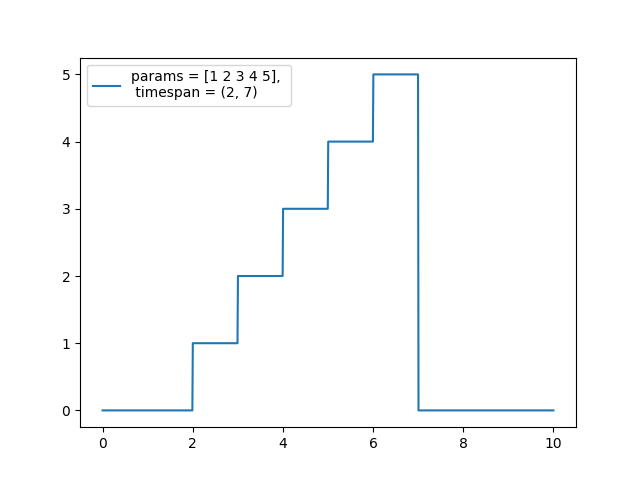qml.pulse.pwc¶
- pwc(timespan)[source]¶
Takes a time span and returns a callable for creating a function that is piece-wise constant in time. The returned function takes arguments
(p, t), wherepis an array that defines the bin values for the function.Creates a callable for defining a
ParametrizedHamiltonian.- Parameters:
timespan (Union[float, tuple(float, float)]) – The time span defining the region where the function is non-zero. If an integer is provided, the time span is defined as
(0, timespan).- Returns:
a function that takes two arguments: an
arrayof trainable parameters, and afloatdefining the time at which the function is evaluated.- Return type:
callable
The convenience function
pwcessentially implementsdef pwc(timespan): def wrapped(p, t): return p[int(t/len(p))] return wrapped
This function can be used to create a parametrized coefficient function that is piece-wise constant within the interval
t, and 0 outside it.When creating the callable, only the time span is passed. The number of bins and values for the parameters are set when
paramsis passed to the callable. Each bin value is set by an element of theparamsarray. The variabletis used to select the value of the parameter array corresponding to the specified time, based on the assigned binning.params = jnp.array([1, 2, 3, 4, 5]) time = jnp.linspace(0, 10, 1000) timespan=(2, 7) y = qml.pulse.pwc(timespan)(params, time) plt.plot(time, y, label=f"params={params}, timespan={timespan}") plt.legend() plt.show()

Warning
The final time in the time span indicates the time at which the function output switches from params[-1] to 0. As such, the above function returns
5for a time slightly smaller than the final time intimespan, but it returns0for the final time itself:>>> qml.pulse.pwc(timespan)(params, 6.999999) Array(5., dtype=float32)
>>> qml.pulse.pwc(timespan)(params, 7.) Array(0., dtype=float32)
Example
>>> timespan = (2, 7) >>> f1 = qml.pulse.pwc(timespan) >>> H = f1 * qml.X(0)
The resulting function
f1has the call signaturef1(params, t). If passed an array of parameters and a time, it will assign the array as the constants in the piece-wise function, and select the constant corresponding to the specified time, based on the time interval defined bytimespan.In the following example, passing an array to
pwc((2, 7))evenly distributes the array values in the intervalt=2tot=7. The timetis then used to select one of the array values based on this distribution.>>> H(params=[[11, 12, 13, 14, 15]], t=2.3) 11.0 * X(0)
>>> H(params=[[11, 12, 13, 14, 15]], t=2.5) # different time, same bin, same result 11.0 * X(0)
>>> H(params=[[11, 12, 13, 14, 15]], t=3.1) # next bin 12.0 * X(0)
>>> H(params=[[11, 12, 13, 14, 15]], t=8) # outside the window returns 0 0.0 * X(0)